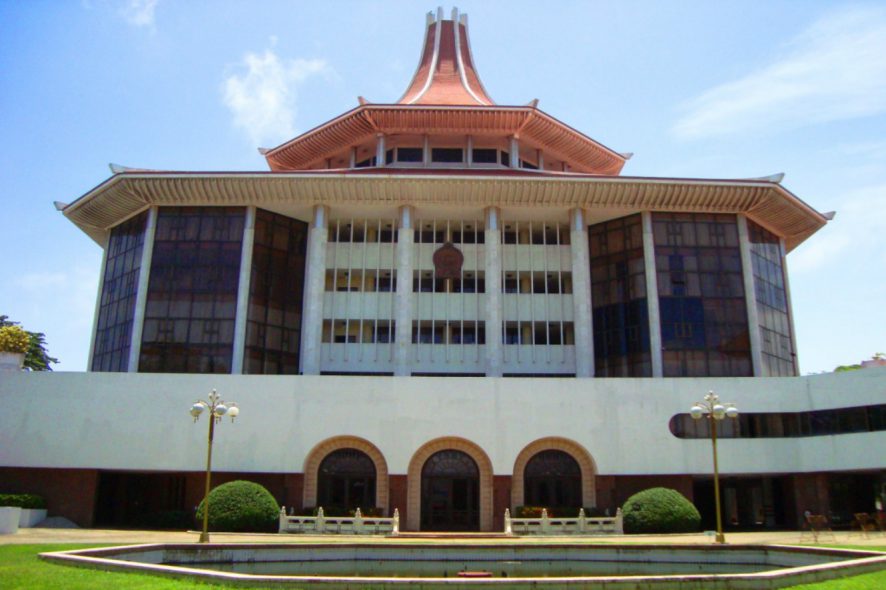Supreme Court of the Democratic Socialist Republic of Sri Lanka: Full Bench of P. Padman Surasena, Janak De Silva and M.A. Samayawardhena, JJ., decided on an application which was filed contending the violation of the fundamental rights under Articles 11, 12 (1), 13 (1), 13 (2) and 13 (3) of the Constitution.
The Petitioner is the wife of the deceased who is alleged to have died while in Police custody. On 25-02-2017 around 4 a.m. the Respondents 1-5 had come to their residence, arrested the deceased and taken him to Peliyagoda Police Station. When inquired as to the reasons for taking him to the police station it was stated that they wanted to record a statement from him. Around 9 a.m. Petitioner had gone to her husband’s house in order to visit Peliyagoda Police Station. It was at that time she was informed that her husband had died and the body was lying at the Colombo General Hospital. One high ranking police officer had explained to the Petitioner; that he was arrested in connection with a robbery of a car and jewelry in Kelaniya and Bandarawatte; that her husband had fallen sick, suffering from a wheezing attack when his statement was recorded; and that he was admitted to the hospital. The Petitioner stated that this briefing was manifestly false in view of the findings in the postmortem report.
This Court on 10-01-2019 had granted leave to proceed only in respect of the alleged violations of Articles 11 and 12(1) of the Constitution. A postmortem examination of the body of the Petitioner’s husband had been conducted at 10.00 am on 26-02-2017 by the Consultant Judicial Medical Officer – Colombo. The Consultant Judicial Medical Officer had observed twenty-eight external injuries on the body of the Petitioner’s husband. The Consultant Judicial Medical Officer has described these injuries as signs of recent injuries and identified the injury pattern as one commonly seen in torture. According to the Post Mortem Report, the cause of death is Hypovolemia due to multiple defuse and extensive muscle and soft tissue contusions caused by blunt force trauma on the body.
The court observed that no more evidence than the above list of external injuries on the body of the Petitioner’s husband along with the opinion of the consultant Judicial Medical Officer was required to conclude that somebody had used blunt force trauma on the Petitioner’s husband. The 1st to 5th Respondents were obliged in law to keep the Petitioner’s husband in their safe custody as long as they kept him in their custody as a suspect pending further investigations. The 1st to 5th Respondents have not explained as to how the Petitioner’s husband who was in their custody had sustained not one or two but twenty-eight injuries listed above. Thus, in the absence of any explanation by the 1st to 5th Respondents, the only irresistible conclusion is that the 1st to 5th Respondents had used blunt force trauma on the Petitioner’s husband while in their custody after his arrest and that had brought him a considerable number of injuries on his body.
The Court relied on the judgment of Sriyani Silva v. Iddamalgoda, Officer-in-Charge, Police Station Paiyagala, 2003 (2) SLR 63 whereby His Lordship Justice Mark Fernando, held that Article 13(4) impliedly recognized the right to life at least in the sense of mere existence, as distinct from the quality of life which can only be deprived of, by a court order and that Article 11 (read with Article 13(4)), recognizes a right not to deprive a citizen of his life whether by way of punishment or otherwise. His Lordship went on to hold that the jurisdiction conferred by the Constitution on this Court for the sole purpose of protecting fundamental rights against executive action must be deemed to have conferred all that is reasonably necessary for this Court to protect the said rights effectively. In this case it was further held that the lawful heirs and/or dependents are entitled to institute proceedings under Article 126(2) read with Article 17 in respect of the infringement of the aforesaid fundamental rights.
The Court held that the Respondents 1-5 have infringed the fundamental rights of the Petitioner’s husband guaranteed under Article 11 and 12(1) of the Constitution and awarded a sum of 1,000,000, as compensation, of which a sum of Rs 750,000 shall be paid by the State and Rs 50,000 each by the Respondents personally.[Jayamuni Anuradha Nilmini Vijesekara v. Sumedha Thushanga, 2021 SCC OnLine SL SC 2, decided on 14-07-2021]
Counsel:
Lakshan Dias with Miss Maneesha Kumarasinghe for the Petitioner.
Amila Palliyage with Ms. Nihara Randeniya and Ms. Sandeepani Wijesooriya and Mr. Daminde De Alwis and Ms. Ruwanthi Doralagoda for the 1st to 3rd Respondent.
Sunjith Senanayake with Saranga Perera instructed by Upul Dissanayake for the 4th and 5th Respondents.
*Suchita Shukla, Editorial Assistant has put this story together.







